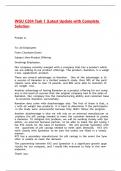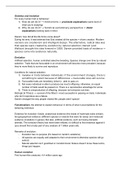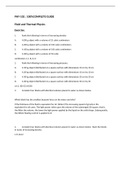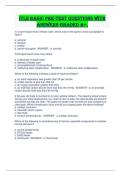SED Task 4 Helping behavior, sharing, altruism
Learning goals
1. Development of helping behavior
2. Differences monkeys and humans
3. Development of altruism
4. Allocation of resources
Warneken
Altruistic tendencies depend on the costs, benefits and contexts involved. The three new
domains most investigated are: helping with goods, services or information.
Helping
Infants help pick up a dropped object from 14-18m, even going through some trouble, without
encouragement or praise. To provide help, they have to understand the other’s goal and be
motivated to help them achieve it. Chimpanzees help others in some of the same situations,
but not the complex ones. This suggests that helping comes naturally to humans. Rewarding
does not improve helping, it might even decrease it (overjustification reward).
Sharing
In sharing, children turn out to be more generous with resources than are chimpanzees, but the
comparison is complex, spanning four different ways of sharing.
- Chimpanzees usually compete over food but they do share in some circumstances
(desired coalitionary and sexual partners). However, they are reluctant to risk giving
up a lower-value item for a potential higher-value item, indicating a lack of trust that
the return benefit will be forthcoming
- Chimpanzee mothers (sometimes others) will tolerate other individuals taking their
food (passive sharing), is restricted to low quality food, or when it is difficult to
monopolize. Mother chimps sometimes share with their infants more actively, but
usually leftovers. In humans, even young children share food and other resources from
an early age
- In mutualistic cooperation, chimps hav a great difficulty sharing the spoils at the end,
if not already divided in two portions. Human children share food equally, portions or
not.
- Chimps show a lack of concern for what a partner gets, even if it cost them nothing,
when pulling a tray of food for themselves and possibly another. Human children do
ull more when the other gets something too.
Possible explanation differences:
- it is mainly due to social-cognitive differences because the need for altruistic
intervention is usually more salient in instrumental helping situations (in which an
individual is actively struggling with a problem).
- It is due to different forms of foraging in the two species. Humans transitioned from
more individual to more cooperative hunting and gathering, which cannot readily
occur when there is difficulty sharing the spoils after they are obtained. Therefore, it is
possible that food represents a special domain in which humans have become more
tolerant, and ultimately more altruistic, toward others.
Informing
Learning goals
1. Development of helping behavior
2. Differences monkeys and humans
3. Development of altruism
4. Allocation of resources
Warneken
Altruistic tendencies depend on the costs, benefits and contexts involved. The three new
domains most investigated are: helping with goods, services or information.
Helping
Infants help pick up a dropped object from 14-18m, even going through some trouble, without
encouragement or praise. To provide help, they have to understand the other’s goal and be
motivated to help them achieve it. Chimpanzees help others in some of the same situations,
but not the complex ones. This suggests that helping comes naturally to humans. Rewarding
does not improve helping, it might even decrease it (overjustification reward).
Sharing
In sharing, children turn out to be more generous with resources than are chimpanzees, but the
comparison is complex, spanning four different ways of sharing.
- Chimpanzees usually compete over food but they do share in some circumstances
(desired coalitionary and sexual partners). However, they are reluctant to risk giving
up a lower-value item for a potential higher-value item, indicating a lack of trust that
the return benefit will be forthcoming
- Chimpanzee mothers (sometimes others) will tolerate other individuals taking their
food (passive sharing), is restricted to low quality food, or when it is difficult to
monopolize. Mother chimps sometimes share with their infants more actively, but
usually leftovers. In humans, even young children share food and other resources from
an early age
- In mutualistic cooperation, chimps hav a great difficulty sharing the spoils at the end,
if not already divided in two portions. Human children share food equally, portions or
not.
- Chimps show a lack of concern for what a partner gets, even if it cost them nothing,
when pulling a tray of food for themselves and possibly another. Human children do
ull more when the other gets something too.
Possible explanation differences:
- it is mainly due to social-cognitive differences because the need for altruistic
intervention is usually more salient in instrumental helping situations (in which an
individual is actively struggling with a problem).
- It is due to different forms of foraging in the two species. Humans transitioned from
more individual to more cooperative hunting and gathering, which cannot readily
occur when there is difficulty sharing the spoils after they are obtained. Therefore, it is
possible that food represents a special domain in which humans have become more
tolerant, and ultimately more altruistic, toward others.
Informing












